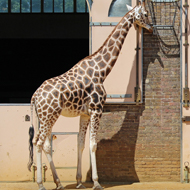Rescue package announced for zoos and aquariums in England

Zoos and aquariums were allowed to reopen with social distancing measures on 15 June.
Animal welfare minister Zac Goldsmith has announced a £100 million rescue package for zoos and aquariums in England to help alleviate the impacts of the coronavirus pandemic.
Expanding on the £14 million initial relief fund announced in May, the package will run until the end of March 2021, providing long-term support to institutions struggling with the effects of the virus.
Zoos and aquariums were allowed to reopen with social distancing measures on 15 June. But the increased safety measures mean that many establishments are limited to fewer visitors, and may struggle to recoup the income lost during the lockdown.
There are several support schemes already available to zoos, including the Job Retention Scheme, VAT deferral and Business Rates Relief. This new funding will help zoos cover costs relating to animal keeping such as feed, heating and security.
Animal welfare minister Lord Goldsmith said: “We have a world-leading zoo and conservation sector, and I know how hard zoos have been working to safeguard the welfare of their animals in the face of real financial hardship and uncertainty.
“Allowing zoos to reopen has taken off some of the pressure, but the coronavirus pandemic has left them facing long-term financial problems. This funding will, therefore, be a lifeline for our zoos and aquariums and ensure the quality of animal care continues over the coming months.
“I will continue to work with the zoo and conservation community to ensure they get the support they need.”
Chief secretary to the treasury, Steve Barclay, said: “Whilst zoos and aquariums are now able to reopen their doors, we know how difficult the past few months have been. That’s why we’ve been doing everything we can to support them.
“This extra £100 million of funding will ensure those affected by the outbreak can continue to care for their animals as well as the important conservation and educational work.”
Dr Simon Girling, chair of the Zoo Experts Committee, said: “The Zoo Experts Committee is pleased that the UK Government has listened to the scientific advice of the Committee and not only provided an animal welfare fund at the start of the pandemic for zoos in financial difficulties associated with the lockdown, but they have now made the move to open all parts of zoos from 4 July with appropriate social distancing for public and animal safety.
“ZEC welcomes these moves and believes this funding will ensure zoos are able to generate much-needed income to fund the ongoing care of their animals and much of their valuable conservation work at this challenging time for everyone.”



 The Veterinary Medicines Directorate (VMD) is inviting applications from veterinary students to attend a one-week extramural studies (EMS) placement in July 2026.
The Veterinary Medicines Directorate (VMD) is inviting applications from veterinary students to attend a one-week extramural studies (EMS) placement in July 2026.